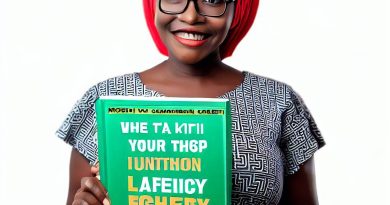Financial Literacy: Bridging the Gap in Nigeria
Last Updated on January 27, 2024
Introduction
Financial literacy refers to the knowledge and understanding of financial concepts and skills.
It is crucial for personal and national development as it empowers individuals to manage their finances effectively.
This article will focus on bridging the financial literacy gap in Nigeria.
In Nigeria, there is a significant lack of financial literacy, with many people lacking basic financial knowledge.
This knowledge gap leads to poor financial decisions, limited access to financial services, and overall economic instability.
Bridging this gap is essential as it will empower individuals to make informed financial decisions, improve their financial well-being, and contribute to the growth of the economy.
Efforts to bridge the financial literacy gap in Nigeria should start with education.
Financial literacy should be included in school curricula to ensure that young people are equipped with the necessary skills to manage their finances.
Furthermore, there should be initiatives to educate adults on financial literacy through workshops, seminars, and online platforms.
Engaging financial institutions and government agencies in promoting financial literacy is also crucial.
These institutions can provide accessible and accurate information, develop user-friendly financial products, and offer financial literacy programs.
By bridging the financial literacy gap in Nigeria, individuals will be empowered to take control of their financial futures, contribute to economic growth, and achieve overall financial well-being.
Current State of Financial Literacy in Nigeria
In Nigeria, the current state of financial literacy is alarming, with statistics revealing low levels of knowledge and understanding in this area.
Several factors contribute to the gap in financial literacy, including limited access to quality education and lack of awareness programs.
The consequences of low financial literacy levels are detrimental, affecting individuals, families, and the overall economy.
Statistics on the low levels of financial literacy in Nigeria
- Less than 30% of Nigerian adults possess basic financial knowledge.
- Only 40% of Nigerians have access to banking services, limiting their exposure to financial concepts.
- Approximately 60% of Nigerians do not have a savings account or any form of financial plan.
- Less than 20% of Nigerians understand the importance of insurance and its benefits.
- A significant number of Nigerians are unaware of investment options and lack basic investment knowledge.
Factors contributing to the gap in financial literacy
- Limited access to quality financial education in schools and colleges.
- Lack of awareness programs and campaigns to promote financial literacy.
- Absence of mandatory financial education curriculum in academic institutions.
- High levels of poverty and economic inequality, prioritizing immediate survival over financial education.
- Limited availability of financial resources and tools for individuals to enhance their financial knowledge.
Consequences of low financial literacy levels
- Increased vulnerability to financial scams and fraudulent activities.
- Inability to make informed financial decisions, leading to excessive debts and financial stress.
- Higher unemployment rates as individuals lack the necessary skills to manage finances effectively.
- Impacted retirement planning, resulting in financial insecurity during old age.
- Reduced economic growth and development as a financially illiterate population struggles to contribute effectively.
The current state of financial literacy in Nigeria requires urgent attention and action.
Government bodies, educational institutions, and financial organizations must collaborate to bridge the gap.
Efforts should be made to incorporate financial education into formal education curricula, ensuring all individuals, irrespective of their socioeconomic status, receive basic financial knowledge.
Furthermore, awareness programs and campaigns should be conducted regularly to promote financial literacy among all segments of society.
Access to financial resources, such as free educational materials, workshops, and online courses, should be improved to empower individuals to enhance their financial literacy.
By addressing the current state of financial literacy in Nigeria, we can empower individuals to make informed financial decisions, uplift communities, and drive sustainable economic growth.
Read: Decoding Taxes: A Financial Literacy Guide for Nigeria
Challenges to Financial Literacy in Nigeria
Financial literacy is crucial in today’s world, as it empowers individuals to make informed financial decisions and achieve financial stability.
However, in Nigeria, there are several challenges that hinder the spread of financial literacy among its population.
These challenges include a lack of access to financial education and resources, socioeconomic factors affecting financial literacy rates, and cultural and traditional barriers to financial literacy.
1. Lack of access to financial education and resources
One of the significant challenges to financial literacy in Nigeria is the lack of access to proper financial education and resources.
Many individuals, particularly those in rural areas, do not have the opportunity to learn about basic financial concepts and strategies.
This limited access to financial education prevents them from developing the necessary skills to manage their finances effectively.
2. Socioeconomic factors affecting financial literacy rates
Another challenge to financial literacy in Nigeria is the socioeconomic factors that impact the literacy rates.
High poverty levels, unemployment, and income inequality make it difficult for individuals to prioritize financial education.
When basic needs are not met, financial literacy becomes a lower priority, leading to a lack of financial knowledge and skills.
3. Cultural and traditional barriers to financial literacy
Nigeria’s cultural and traditional values also pose barriers to the spread of financial literacy.
Traditional beliefs and practices often discourage open discussions about money, leading to a lack of financial transparency within families and communities.
Additionally, some cultural norms prioritize saving and investing in physical assets, such as land or gold, rather than in financial instruments like stocks or bonds.
Addressing these challenges is crucial for bridging the gap in financial literacy in Nigeria.
The following strategies can be implemented to overcome these obstacles:
1. Improve access to financial education
Efforts should be made to increase access to financial education, particularly in rural areas.
This can be done by partnering with schools, community centers, and NGOs to provide financial literacy programs and workshops.
Online resources, such as webinars and tutorials, can also be utilized to reach a larger audience.
2. Integrate financial education into the curriculum
Introducing financial education as a mandatory subject in schools will enhance the reach of financial literacy.
By incorporating financial concepts into the curriculum, students can develop essential financial skills from an early age, empowering them to make informed financial decisions in the future.
3. Raise awareness through media and technology
Utilizing various media platforms, such as television, radio, and social media, can help raise awareness about the importance of financial literacy.
Public service campaigns and educational advertisements can effectively spread the message to a wide audience.
Additionally, using technology-based tools, such as mobile apps and online platforms, can provide individuals with easy access to financial information and resources.
4. Collaborate with financial institutions and NGOs
Partnership between financial institutions and non-governmental organizations (NGOs) can significantly contribute to improving financial literacy rates.
Financial institutions can sponsor and support financial literacy programs and workshops, while NGOs can provide the necessary expertise and outreach to marginalized communities.
5. Address cultural barriers through tailored approaches
To overcome cultural barriers, financial education programs should be tailored to respect and address traditional values.
Cultural norms and practices can be integrated into the curriculum, making financial literacy more relatable and acceptable within the local context.
Engaging community leaders and influencers can also help break the stigma surrounding financial discussions and encourage open dialogue.
In general, the challenges to financial literacy in Nigeria, including a lack of access to financial education and resources, socioeconomic factors, and cultural barriers, need to be addressed for the wellbeing and empowerment of individuals.
Implementing strategies like improving access to financial education, integrating it into the curriculum, raising awareness, collaborating with stakeholders, and tailoring approaches can be instrumental in bridging the gap in financial literacy in Nigeria.
Read: Why Financial Literacy Matters for Nigerians
Importance of Financial Literacy in Nigeria
Financial literacy holds immense importance in Nigeria, as it boosts personal money management skills, enabling informed financial choices.
This knowledge empowers effective resource management, wise budgeting, and future planning.
Additionally, it drives economic growth by fostering productive economic involvement, reducing poverty.
Understanding savings, investments, and entrepreneurship aids wealth creation and community development.
Furthermore, financial literacy promotes Nigerian investments and savings by dispelling misconceptions about financial tools, encouraging informed decisions.
This investment and savings culture enhances economic stability and living standards.
To further emphasize the importance of financial literacy,
here are some key points:
- Improved decision-making: Financially literate individuals are better equipped to make informed decisions regarding their finances, such as choosing the right investment options or managing debt.
- Debt management: Financial literacy helps individuals understand the consequences of borrowing and how to manage debt effectively. This can prevent individuals from falling into a cycle of poverty and debt.
- Entrepreneurship and job creation: Financial literacy encourages individuals to explore entrepreneurship opportunities, leading to the creation of more jobs and economic growth.
- Consumer protection: Financially literate individuals are aware of their rights and responsibilities as consumers, reducing the likelihood of falling victim to scams or fraudulent activities.
- Long-term financial planning: Financial literacy enables individuals to plan for their long-term financial goals, such as retirement or higher education for their children.
Basically, financial literacy is of utmost importance in Nigeria.
By enhancing personal financial management skills, strengthening the economy, and encouraging investments and savings, individuals can achieve economic stability and improve their overall quality of life.
It is essential for both individuals and the government to prioritize financial education to bridge the gap in Nigeria’s financial literacy levels and pave the way for a brighter future.
Read: The Role of Financial Literacy in Nigeria’s Economy

Efforts to Bridge the Financial Literacy Gap
In Nigeria, the lack of financial literacy is a significant challenge that needs to be addressed.
Many individuals, particularly those from low-income backgrounds, struggle to understand basic financial concepts and make informed financial decisions.
However, several initiatives and organizations are working tirelessly to bridge this gap and promote financial literacy across the country.
1. Government initiatives and policies
The Nigerian government recognizes the importance of financial literacy and has taken various steps to address the issue.
The Central Bank of Nigeria (CBN) has implemented policies and programs aimed at improving financial literacy among citizens.
For instance, the CBN has introduced financial literacy education in schools and universities, integrated financial education into the national curriculum, and provided financial literacy training for teachers.
Additionally, the government has created platforms such as the Financial Literacy Portal, which offers resources and information on financial management.
These initiatives aim to empower individuals with the knowledge and skills necessary to make sound financial decisions.
2. Role of educational institutions in promoting financial literacy
Educational institutions play a crucial role in promoting financial literacy among students.
Many schools and universities in Nigeria have recognized the importance of equipping students with financial skills and have incorporated financial education into their curriculum.
They provide courses that cover topics like budgeting, saving, investing, and debt management.
Furthermore, educational institutions organize workshops, seminars, and events to educate students on financial matters.
These platforms create opportunities for students to learn about financial literacy, engage with finance professionals, and develop practical skills in managing their finances.
3. Non-profit organizations and community-driven campaigns
Non-profit organizations and community-driven campaigns are instrumental in spreading financial literacy awareness among Nigerians.
These organizations work towards empowering individuals to make informed financial decisions and provide resources and education on financial management.
They organize workshops, training sessions, and awareness campaigns targeting different segments of society, including rural communities and vulnerable populations.
Through these initiatives, non-profit organizations aim to empower individuals with financial knowledge and skills, enabling them to improve their financial well-being.
Top government initiatives
- Introduction of financial literacy education in schools and universities.
- Integration of financial education into the national curriculum.
- Financial literacy training for teachers.
Key roles of educational institutions
- Incorporation of financial education into the curriculum.
- Organization of workshops, seminars, and events focused on financial literacy.
Influential non-profit organizations and community-driven campaigns
- Workshops, training sessions, and awareness campaigns targeting rural communities and vulnerable populations.
- Provision of resources and education on financial management.
In essence, efforts to bridge the financial literacy gap in Nigeria are being made through government initiatives, educational institutions, and non-profit organizations.
These initiatives aim to equip individuals, especially those from low-income backgrounds, with the necessary knowledge and skills to make informed financial decisions.
By promoting financial literacy, Nigeria can empower its citizens and foster economic growth and stability.
Read: From Naira to Dollars: Currency Literacy for Nigerians
Uncover the Details: How Financial Literacy Impacts Nigerian Small Businesses
Strategies for Improving Financial Literacy in Nigeria
Financial literacy is a crucial aspect of personal and national development.
In Nigeria, there is a significant gap that needs to be addressed in order to improve financial literacy among the population.
To bridge this gap, several strategies can be implemented:
1. Targeted financial education programs for different demographic groups
Recognizing the diversity within Nigeria, it is essential to design financial education programs that cater to the specific needs of different demographic groups.
This includes tailoring programs for women, youth, rural communities, and low-income earners.
These programs should be conducted in local languages and incorporate real-life examples to ensure better comprehension.
2. Improving access to financial services and products
Limited access to financial services and products is a major barrier to financial literacy in Nigeria.
To address this, efforts should be focused on increasing the availability and affordability of banking services, savings accounts, microcredit facilities, and insurance products, especially in underserved areas.
Mobile banking platforms can play a crucial role in expanding access to financial services, as they have already demonstrated in Nigeria.
3. Digital platforms and technologies for enhancing financial literacy
With the widespread use of smartphones and the internet, digital platforms can be leveraged to deliver financial education to a larger audience.
Mobile applications, online courses, and interactive websites can provide individuals with easy access to financial literacy resources.
These platforms can cover a wide range of topics such as budgeting, saving, investing, and debt management.
Additionally, gamification techniques can be employed to make learning more engaging and enjoyable.
4. Collaboration between government, educational institutions, and financial institutions
It is crucial to foster collaboration between different stakeholders to improve financial literacy in Nigeria.
The government can introduce financial literacy curriculum in schools to instill the importance of financial knowledge from an early age.
Financial institutions can partner with schools and universities to provide practical learning opportunities, such as internships and workshops.
Additionally, financial regulators can establish guidelines for the inclusion of financial education as part of financial institution operations.
5. Public awareness campaigns
Raising awareness about the importance of financial literacy is a critical step in bridging the gap.
Public awareness campaigns can use various platforms, such as television, radio, social media, and community events, to reach a wider audience.
These campaigns should emphasize the benefits of financial literacy, such as improved personal financial management, increased savings, reduced debt, and better planning for the future.
6. Peer-to-peer learning and mentoring programs
Promoting peer-to-peer learning and mentoring programs can be an effective way to enhance financial literacy.
Encouraging individuals who have achieved financial stability and success to share their experiences can inspire and guide others.
Mentoring programs can also provide personalized guidance on financial goals, budgeting, investment, and debt management.
7. Regular evaluation and monitoring
To ensure the effectiveness of financial literacy initiatives, regular evaluation and monitoring are essential.
This can involve collecting data on the impact of programs, conducting surveys and assessments, and measuring changes in financial behavior and knowledge.
Based on these evaluations, necessary adjustments can be made to improve the effectiveness of future initiatives.
By implementing these strategies, Nigeria can take significant steps towards improving financial literacy across the country.
Empowering individuals with financial knowledge and skills will not only benefit them personally but also contribute to the overall economic growth and stability of the nation.
Uncover the Details: Nigeria’s Saving Culture: A Financial Literacy Study
Success Stories and Best Practices
Successful financial literacy initiatives in Nigeria
- The WISE Women Organization has successfully empowered women in rural communities with financial literacy skills.
- The Nigerian Stock Exchange promotes financial literacy among students through their X-GEN program.
- The Central Bank of Nigeria’s Financial Literacy Day has reached millions of individuals across the country.
- The Junior Achievement Nigeria organization provides practical financial education to young people.
Strategies and lessons learned from these initiatives
- Collaboration with local authorities and community leaders has been key in the success of these initiatives.
- Using technology, such as apps and online platforms, has made financial literacy more accessible to remote areas.
- Providing practical tools and resources, like budgeting templates and savings plans, has improved the effectiveness of these initiatives.
- Engaging local celebrities and influencers as ambassadors has helped increase awareness and participation.
Action and support initiatives
- Financial literacy is crucial for individuals to make informed decisions and improve their financial well-being.
- By supporting financial literacy initiatives, readers can contribute to the development of their communities.
- Volunteering or donating to organizations that promote financial literacy can make a significant impact.
- Encouraging schools and local institutions to include financial literacy in their curricula can create long-term change.
Successful financial literacy initiatives in Nigeria, such as those implemented by the WISE Women
Organization and the Nigerian Stock Exchange, have shown the positive impact of providing financial education to individuals.
Collaborating with local authorities, utilizing technology, and providing practical tools are proven strategies that have helped bridge the gap in financial literacy.
It is essential for readers to take action and support initiatives in their communities, as financial literacy plays a vital role in personal and community development.
By volunteering, donating, and advocating for financial literacy, individuals can contribute to a more financially educated society.
Conclusion
In summary, financial literacy plays a vital role in Nigeria’s development and economic growth.
It empowers individuals to make informed financial decisions and avoid financial pitfalls. Bridging the gap in financial literacy requires collaborative efforts from both individuals and organizations.
To address this gap, it is crucial for individuals to take responsibility for their financial education.
They should seek opportunities to learn about budgeting, saving, investing, and managing debt.
Organizations, such as banks, government agencies, and educational institutions, can play a significant role in promoting financial education.
Collaborative efforts are essential to bridge the gap effectively.
This can be achieved through partnerships between government bodies, financial institutions, and non-profit organizations.
By combining resources and expertise, these stakeholders can develop comprehensive programs and initiatives that reach a wider audience.
It is crucial to encourage individuals and organizations to actively participate in promoting financial literacy.
People should take advantage of available resources, such as financial literacy courses and workshops.
Organizations can support initiatives that provide accessible and practical financial education to underserved communities.
By collectively working towards improving financial literacy, we can empower individuals to build a secure financial future and contribute to the overall development of Nigeria.
Let us all come together to bridge the gap and create a financially literate nation.


